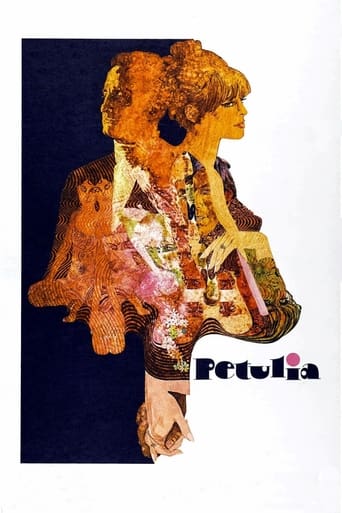jarrodmcdonald-1
Some reviewers have complained that PETULIA is a bit of a downer-- that it is a little too depressing to watch. But this movie is not supposed to make you feel good...it's supposed to make you think about life and relationships. Lead actress Julie Christie is superb as always and so is her costar, George C. Scott. In a supporting role, Richard Chamberlain adds an interesting element to the proceedings, as does Joseph Cotten in an extended cameo as his father. The film's jagged time line keeps its viewer on tenterhooks, wondering where Julie Christie's character will end up in this story about post-traumatic stress and recovery. Great, provocative cinema.
Edgar Soberon Torchia
1968 was a remarkable year in the history of cinema. Films as Pasolini's "Teorema", Anderson's "if...." and Kubrick's "2001: A Space Odyssey", among others, reflected the times of sudden and often violent changes people were experiencing all over the world. "Petulia" is among those motion pictures, but it is obvious Warner Brothers executives did not realize what had director Richard Lester delivered, and handled the product badly, as the original trailer eloquently shows. I finally had the opportunity to see it after many years, since I saw it included in a list of best films, in James Monaco's book "American Film Now". "Petulia" (based on the novel by John Haase, "Me and the Arch Kook Petulia") touches neuralgic issues of difficult times in the United States in an oblique manner, not to avoid them, but because its center is the title character played by Julie Christie (excellent as usual): hippie culture, racial conflicts, Vietnam, drugs, illegal immigration, the intrusion of technology in the bedroom, and middle-class betrayal before the reign of so-called "savage capitalism", all appear as variables in the drama of a young woman abused by her husband. The script of "Petulia" is a guide to moderation and restraint: the film does not emphasize nor is it redundant, but paints all those aspects as integral parts of the portrait of a British woman trapped in (and adapted to) the life of her rich and influential in-laws, and whose intent of rupture is as fragile, fragmented and banal as her personal structure. This is told in a most innovative way for its time, which makes it more regrettable that the film was handled as a pop extravaganza, when it was an innovative and puzzling product with a structure that demanded a more intellectual participation from the audience; and with an organic use of the flash-forward technique (proposed by its editor, Antony Gibbs), an anticipation device that would become common practice in later years (it is interesting to note that five years later the cinematographer of "Petulia", Nicolas Roeg, would direct Julie Christie in the horror drama "Don't Look Now", which contains a scene film editors often mention as an outstanding example of the flash-forward technique, a sex scene inter-cut with takes of the following scene, edited by Graeme Clifford). For many who only think of Richard Lester as the maker of The Beatles movie, "Petulia" is one of several titles of his making that ask for a reconsideration of his work, which also includes very enjoyable period comedies as "A Funny Thing Happened on the Way to the Forum", "Robin and Marian", "The Three Musketeers" and "The Four Musketeers".
ags123
There's a reason this "undiscovered gem" remains undiscovered: It's lousy. On just about all counts. Considering the talent involved, it's surprising how bad it is. How can a Richard Lester film be so boring? The characters are completely unsympathetic and underdeveloped. The scene between George C. Scott and Shirley Knight is designed to reveal the essence of their failed relationship, but it's so shallow, all I could focus on was who's gonna clean up the food he threw at her? Richard Chamberlain's portrayal of an inattentive, abusive husband is totally unconvincing, though the real fault is in the writing. And Julie Christie, looking beautiful in her prime, has to be referred to by everyone as a "kook" several times, otherwise we might not get it. Wasted too, are the amazing San Francisco locations. Nicholas Roeg had every opportunity to showcase this picturesque city, but instead fills the frame with ugly, dated interiors. This humorless look at troubled losers never gets off the ground.
jonnyss
spoiler alert this movie is psychologically right on. petulia is in a bad marriage with bad in-laws, and archie is her way out. archie almost rescues her, but not quite. her indirectness and whimsy mask a good heart. "why didn't you come get me when you had the chance?" is the tragedy of the movie. she does rescue him: under her influence, he grows from angry, bitter, and alienated to lively and engaged - most vividly with his kids. but not present enough soon enough to take the stand of rescuing her and she stays in her compromise marriage.i'm not troubled by the flashbacks at all. they are straightforward, easy to follow, and mostly appear as memories would. much easier to follow than a soderberg movie like "the limey" - which i also liked - in which time is presented at the director's taste. in this movie we (mostly) see subjective time; the characters view the present and are triggered into the past.




